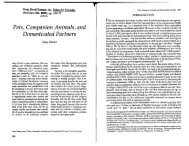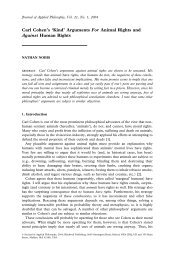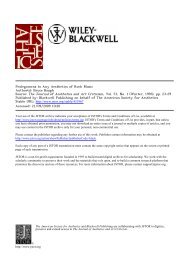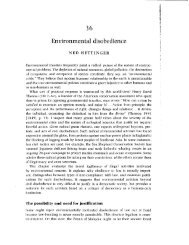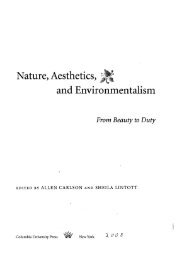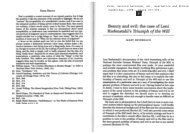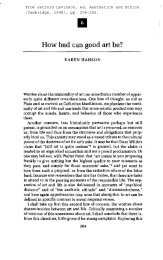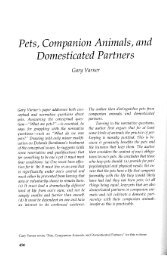Anthropocentrism vs. Nonanthropocentrism: Why Should We Care?
Anthropocentrism vs. Nonanthropocentrism: Why Should We Care?
Anthropocentrism vs. Nonanthropocentrism: Why Should We Care?
You also want an ePaper? Increase the reach of your titles
YUMPU automatically turns print PDFs into web optimized ePapers that Google loves.
170<br />
KATIE MCSHANE<br />
For at least the last 30 years now, there has been a running debate among environmental<br />
ethicists about whether anthropocentrism can serve as an adequate<br />
foundation for environmental ethics. The most recent discussions of this issue<br />
have concerned Bryan Nortonʼs ʻconvergence hypothesisʼ – the view that if we<br />
have a suitably sophisticated anthropocentrism, then in practice, anthropocentrism<br />
and nonanthropocentrism will converge. 1 That is to say, they will both<br />
recommend the same environmentally responsible behaviours and policies. If<br />
this is so, then one might think the dispute between them is merely academic<br />
– a matter for ʻintramural philosophical debateʼ, but nothing more. 2<br />
In this paper, I grant for the sake of argument that anthropocentric and nonanthropocentric<br />
ethics will converge when it comes to the policies and behaviours<br />
they recommend. I also grant that as practical ethicists, we should demand that<br />
there be an issue of practical importance at stake before we commit our time and<br />
energy (not to mention journal space, etc.) to addressing a theoretical dispute. If<br />
two theories have exactly the same practical implications, we shouldnʼt spend our<br />
time worrying about what other differences there might be between them. What<br />
I want to explore here is the question of what counts as a ʻpractical implicationʼ<br />
of an ethical theory. In practical ethics, we often talk as though ethical questions<br />
are just questions about which actions to take or which policies to adopt. There<br />
is, however, a long history in ethics of being concerned with questions of how<br />
to feel, what attitudes to take toward different things in the world, which things<br />
to care about and how to care about them. 3 The aim of this paper is to consider<br />
what significance the differences between anthropocentrism and nonanthropocentrism<br />
might have from the point of view of these questions.<br />
I. BACKGROUND<br />
First, some definitional clarity. Different authors have offered different definitions<br />
of ʻanthropocentrismʼ and ʻnonanthropocentrismʼ, so let me make clear at<br />
the outset what I take these terms to mean. <strong>Anthropocentrism</strong>, as I understand<br />
it, is the view that the nonhuman world has value only because, and insofar as,<br />
it directly or indirectly serves human interests. 4 <strong>Nonanthropocentrism</strong> is just<br />
the denial of this – i.e., the view that it isnʼt the case that the nonhuman world<br />
has value only because, and insofar as, it directly or indirectly serves human<br />
interests. 5<br />
One noteworthy feature of these definitions is that they remain silent on the<br />
issue of intrinsic value. There are two reason for this. First, there are quite a few<br />
different meanings of ʻintrinsic valueʼ in use, many of which seem to carry robust<br />
metaphysical implications. Since anthropocentrism is a normative view, not a<br />
metaphysical (or even metaethical) view, its definition should avoid a commitment<br />
to particular metaphysical positions as far as possible. But second, and perhaps<br />
more to the point, it is not true that the only way to deny anthropocentrism is<br />
Environmental Values 16.1







